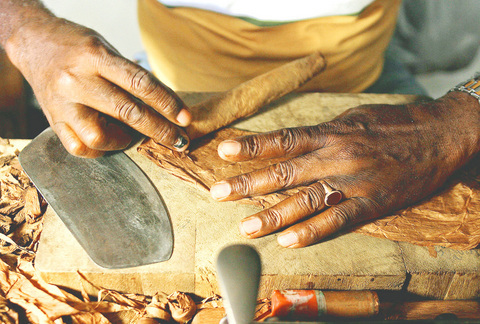When Cuban immigrants moved to this city in the early 1980s, they brought with them their language and traditions, and their love for good, affordable cigars.
Soon several little storefront tabaquerias cropped up, with an owner and maybe an assistant hand-rolling cigars in the back, then selling them from a counter in front.
But today, while Spanish is still commonly heard -- although often studded with the cadences of New Jersey -- the region's cigar makers are fading into memory.

PHOTO: AFP
Jose Suarez's Boquilla Cigar Shop on Bergenline Avenue may be the last such shop in Union City. Cuba Aliados Cigars still has a retail presence but moved its production to Honduras more than a decade ago.
street sales
Now 72, Suarez said his trade has been assailed by high tobacco taxes and the unregulated street sales of premium cigars.
"I'm fighting, trying to maintain my business," Suarez said. "But if things continue as they have, I might have to close, too."
The older gents who used to favor the US$2 cigars most popular at La Boquilla are dying off. The new generation of aficionados favor posh shops selling premium cigars at several times that price -- usually hand-rolled in Honduras, the Dominican Republic, or other climes closer to tobacco fields and inexpensive labor.
Union City's Cuban population has declined substantially in the past quarter-century. Emilio del Valle, a top municipal staffer and founder of the Cuban Day Parade, said Cubans peaked between 60 to 70 percent of the city's population in the 1980s. According to 2000 Census data, 14 percent of Union City's 80,589 documented residents claim Cuban ancestry. Hispanics as a whole comprise 75 percent. Within one block of Suarez's shop are restaurants and bakeries proclaiming heritage from Guatemala, Peru, Mexico and Ecuador.
And in the US, there's scarcity of would-be tabaquero apprentices wanting to learn the painstaking but poor-paying craft of cigar rolling.
"It's not surprising they're having difficulties," said Norman Sharp, of the decline of the storefront cigar makers. Sharp is president of the Cigar Association of America, which represents cigar makers, importers and suppliers. "It stopped being economical to hand-roll cigars in this country decades ago."
Machines began replacing human hands in the 1950s. In the US, Sharp said, 94 percent of the cigars sold are machine-made in such factories as Swisher in Jacksonville, Florida, and John Middleton in King of Prussia, Pennsylvania.
popular with police
At Jimenez Tobacco in downtown Newark, New York; Nelda Pozo and an assistant roll a slightly pricier variety of cigars that are popular with police officers and lawyers frequenting the nearby courthouses. While the business supports her as it did her family for a century earlier in eastern Cuba, Pozo said her now-grown children have pursued other careers. So, too, has Suarez's stepson.
Back in Union City, Suarez continues alone the trade he began learning at age 11 in Placetas, Cuba. One large tobacco leaf acts as a binder around bits of specially aged tobacco, while a second trimmed leaf provides the outer wrapper. The cigars are then stacked and pressed in decades-old wooden boxes. Suarez said he produces about 150 cigars in an eight-hour day.
Despite its name, Boquilla's top-selling Havana brand is a blend of tobaccos from the Dominican Republic, Honduras, Ecuador and Indonesia. The mythic Cuban leaf has not been legally imported into the US since President Kennedy imposed an embargo in 1962.
While cigars allegedly smuggled from Cuba are sold illicitly on the streets of Union City, Suarez said many are fakes. And even authentic Cuban tobacco is not of the quality he recalls before Fidel Castro nationalized the industry.
"It's not bad, but it's not good, either," he said. But mystique sells. Despite his distaste for Castro, if Cuban tobacco were to become legally available, Suarez said he'd sell it -- "because people are always asking for it."

MONEY GRAB: People were rushing to collect bills scattered on the ground after the plane transporting money crashed, which an official said hindered rescue efforts A cargo plane carrying money on Friday crashed near Bolivia’s capital, damaging about a dozen vehicles on highway, scattering bills on the ground and leaving at least 15 people dead and others injured, an official said. Bolivian Minister of Defense Marcelo Salinas said the Hercules C-130 plane was transporting newly printed Bolivian currency when it “landed and veered off the runway” at an airport in El Alto, a city adjacent to La Paz, before ending up in a nearby field. Firefighters managed to put out the flames that engulfed the aircraft. Fire chief Pavel Tovar said at least 15 people died, but

LIKE FATHER, LIKE DAUGHTER: By showing Ju-ae’s ability to handle a weapon, the photos ‘suggest she is indeed receiving training as a successor,’ an academic said North Korea on Saturday released a rare image of leader Kim Jong-un’s teenage daughter firing a rifle at a shooting range, adding to speculation that she is being groomed as his successor. Kim’s daughter, Ju-ae, has long been seen as the next in line to rule the secretive, nuclear-armed state, and took part in a string of recent high-profile outings, including last week’s military parade marking the closing stages of North Korea’s key party congress. Pyongyang’s official Korean Central News Agency (KCNA) released a photo of Ju-ae shooting a rifle at an outdoor shooting range, peering through a rifle scope

South Korea would soon no longer be one of the few countries where Google Maps does not work properly, after its security-conscious government reversed a two-decade stance to approve the export of high-precision map data to overseas servers. The approval was made “on the condition that strict security requirements are met,” the South Korean Ministry of Land, Infrastructure and Transport said. Those conditions include blurring military and other sensitive security-related facilities, as well as restricting longitude and latitude coordinates for South Korean territory on products such as Google Maps and Google Earth, it said. The decision is expected to hurt Naver and Kakao

Gaza is rapidly running out of its limited fuel supply and stocks of food staples might become tight, officials said, after Israel blocked the entry of fuel and goods into the war-shattered territory, citing fighting with Iran. The Israeli military closed all Gaza border crossings on Saturday after announcing airstrikes on Iran carried out jointly with the US. Israeli authorities late on Monday night said that they would reopen the Kerem Shalom crossing from Israel to Gaza yesterday, for “gradual entry of humanitarian aid” into the strip, without saying how much. Israeli authorities previously said the crossings could not be operated safely during